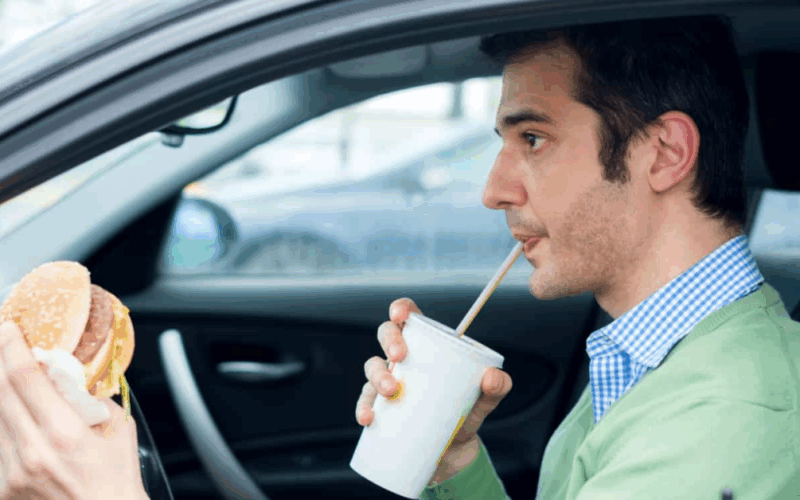What Georgia’s Distracted Driving Law Covers
The Georgia Distracted Driving Law is intentionally broad, designed to address any actions that interfere with a driver’s ability to operate a vehicle safely. The statute explicitly covers “any actions that distract the driver from operating safely.” This means that if eating while driving leads to unsafe behavior such as swerving, missing traffic signals, or delayed reaction times, a driver could face legal consequences—not specifically for eating, but for the unsafe driving it causes.
As outlined by law enforcement, tickets aren’t given for the act of eating itself, but rather for dangerous maneuvers that endanger others on the road. For example, if dropping food results in a driver veering into another lane, that action is what draws legal attention.
Penalties for Eating While Driving and Related Offenses
The Governor’s Office of Highway Safety provides a clear outline of the consequences tied to distracted driving offenses, which escalate with repeated violations:
- First offense: $50 fine and one point on your driver’s license
- Second offense: $100 fine and two points
- Third or subsequent offense: $150 fine and three points
More severe is the charge of reckless driving if eating leads to a traffic accident. Reckless driving carries:
- A $1,000 fine
- Four points on the driving license
- Possible jail time depending on circumstances
The Georgia legal firm T. Madden and Associates emphasizes the importance of negligence when assigning liability in accidents. If an investigation proves a driver was eating and causing distraction at the time of a collision, that driver may be held responsible for damages and fines.
“State law considers negligence a key factor when determining liability,” said representatives from T. Madden and Associates. “Driving distracted – including while eating – can have serious legal consequences if it leads to an accident.”
Common Causes of Distracted Driving and How to Avoid Them
The Georgia Department of Driver Services explains that distracted driving can stem from a variety of activities that shift attention away from the road. Besides eating and drinking, other common distractions include:
- Talking with passengers
- Adjusting radio, climate controls, or navigation systems
- Reading maps or road signs
- Handling dropped items
- Using cell phones or telematic devices
- Daydreaming or mental distractions
To promote safer driving, Georgia authorities recommend the following tips to limit distractions:
- Familiarize yourself with all in-car electronic features before driving
- Pre-program radio stations and plan your route ahead
- Keep the vehicle free of unnecessary objects
- Adjust mirrors for optimal visibility before trips
- Avoid eating, drinking, or smoking while driving
- Do not engage in emotionally intense conversations while behind the wheel
Final Thoughts: Drive First, Eat Later
While Georgia law does not explicitly ban eating and driving, it firmly prohibits distracted driving behaviors that threaten safety on the roads. Drivers should be mindful that snacking behind the wheel could easily lead to dangerous maneuvers, fines, and points on their license—or worse, reckless driving charges if accidents occur.
For more information on Georgia’s Distracted Driving Law and safe driving tips, visit the full article source here.
Key Takeaways:
- Eating while driving in Georgia is not directly illegal but can lead to citations if it causes unsafe driving
- Distracted driving fines escalate with repeated offenses, starting at $50
- Reckless driving charges apply if eating causes an accident, with penalties including fines, license points, and jail time
- Common distracted behaviors extend beyond eating and should be actively avoided
Remember, your safety and that of others depends on your full attention while driving. Make your life easier—drive first, eat later.




